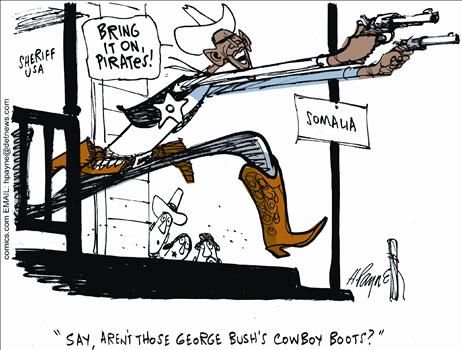All in all, a nice day's work for the U.S. Navy, and in particular for the incomparable SEALs and the captain and crew of the BAINBRIDGE. Capt. Phillips deserves a tremendous amount of credit for his own survival, too. He kept his wits about him under the most trying circumstances imaginable, and managed to maneuver his captors into an untenable situation from which they had no realistic possibility of escape. Finally, credit where credit is due: overall, President Obama handled this situation just about perfectly. Bravo Zulu to all! (That's Navy-ese for "Well Done.")
Nevertheless, I'm just wondering about one thing. When Capt. Phillips attempted to escape from his captors by jumping out of the lifeboat and trying to swim to the nearby USS BAINBRIDGE, apparently no one aboard the destroyer made any attempt to help him. Consider: Capt. Phillips is a 53-year-old man – obviously a man in excellent physical condition, but nevertheless 53 years old &ndash yet he intentionally leaped into shark-infested waters at night. Isn't it likely that he fully expected the crew of the BAINBRIDGE to come to his aid? I'm sure that they wanted to help him – so why didn't they?
As a former U.S. Navy officer, I can think of only two possibilities. Either there was some other factor of which we are not aware which precluded any assistance from the BAINBRIDGE, or – far more likely, I'm afraid – the captain of the BAINBRIDGE was operating under rules of engagement that prohibited him from using force without direct presidential authorization.
In due course, and following not one, but two requests from the Defense Department, the captain of the BAINBRIDGE was finally authorized to do what needed to be done. As soon as the opportunity presented itself, he did it – flawlessly.
But what took so long? Considering the nature of his assignment, why was the captain of the BAINBRIDGE not authorized from the beginning to use his own judgment? And why did the Secretary of Defense have to ask the President twice to grant permission?
As I said, just wondering ...
UPDATE: Over at Pajamas Media, Jeff Emanuel, a military veteran with actual experience as a Special Forces soldier, has also been wondering: The Story of a Successful Rescue (and the Obama Adminstration’s Attempt to Claim Credit). He mistakenly refers to "the small inflatable lifeboat" (it was a 28-foot rigid fiberglass-hulled pod-type craft with a diesel engine), but aside from that minor detail, he's right on the money when he states:
What should have been a standoff lasting only hours — as long as it took the USS Bainbridge and its team of NSWC operators to steam to the location — became an embarrassing four-day-and-counting standoff between a rag-tag handful of criminals with rifles and a U.S. Navy warship.
It'll be worth your time to click the link and read the rest of Jeff's piece. When it comes to Special Ops, he knows what he's talking about – a claim I certainly cannot make. (My three years' experience as a Navy officer was spent aboard a geological survey ship which never fired a shot in anger during my entire tour of duty.)
UPDATE II: Take a look at How the rescue happened by retired Special Forces Master Sergeant Uncle Jimbo, writing at the superb milblog Blackfive. Be sure to read the comments, too – particularly those from Major Kong. Here's a small sample:
Now, how do we deal with the problem of piracy on the Horn of Africa on the larger, long-term, strategic level? Here are my ideas (nothing particularly original here):Great stuff!
1. Arm the merchant ships. If the shipping companies don't want to arm the crews for liability reasons, then hire professional security companies to provide armed escorts while transiting that particular region. Blackwater (or Xe, or whatever they're calling themselves these days) sounds like a perfect fit for this mission, given their roots in the Naval Special Warfare community, and they're probably looking for a few new gigs after losing their biggest contract in Iraq.
2. Utilize "Q-Ship" operations. That is, outfit a number of vessels to look like harmless, helpless merchant ships. Have them ply up and down the East Coast of Africa, making port calls in Mombassa, etc., where the crews disembark and drink it up at the local bars, telling everyone about the fantastically valuable cargoes they are carrying. In fact, of course, the ships are full of special ops-types in full kit, with camouflaged heavy weapons like M2s, Mk-19s, and Barrett .50s. When pirates attempt to assault the Q-Ships, smoke them like beef jerky. Wash, rinse, repeat...
UPDATE III:

Hat tip: Henry Payne and Townhall.com
No comments:
Post a Comment